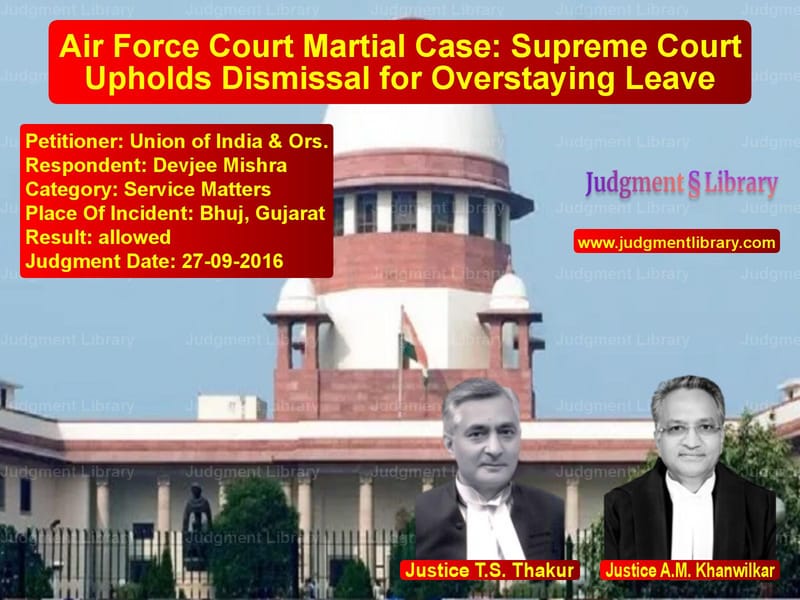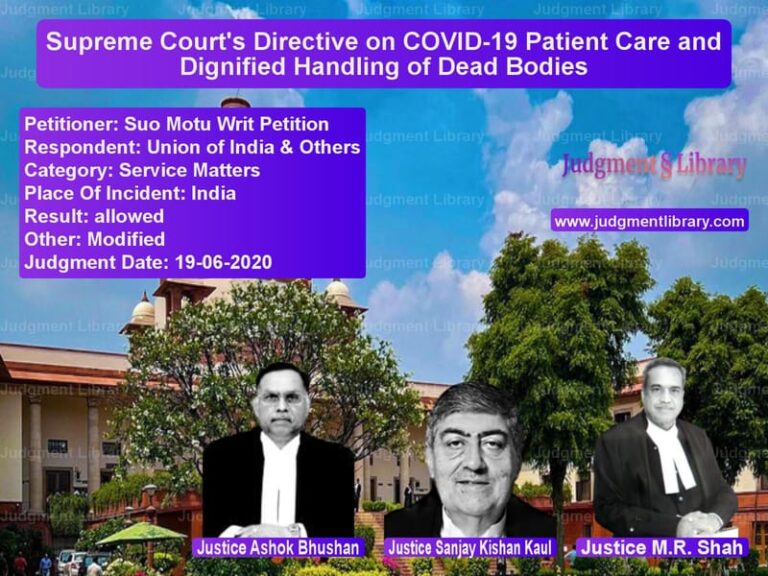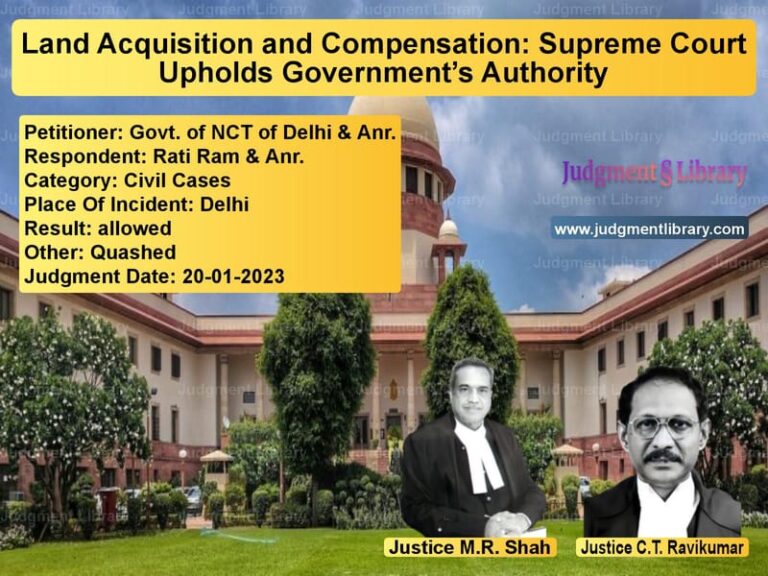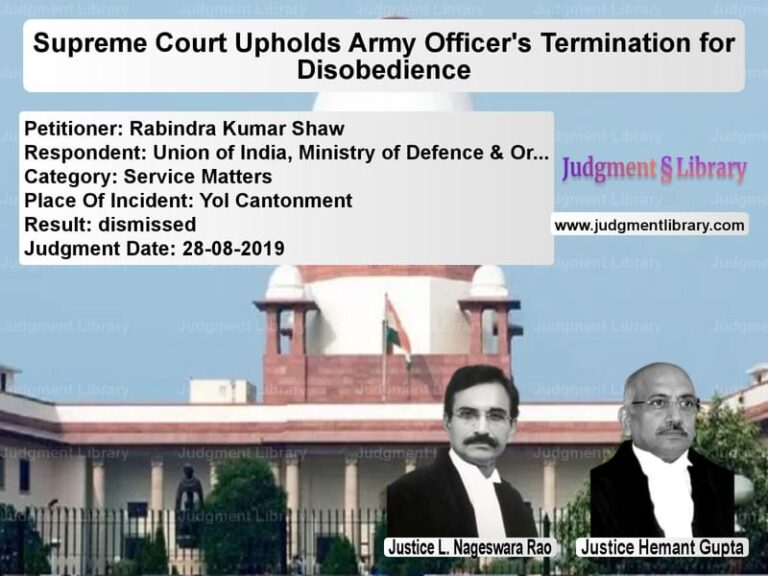Air Force Court Martial Case: Supreme Court Upholds Dismissal for Overstaying Leave
The case of Union of India & Ors. v. Devjee Mishra involves a legal challenge by an Air Force Corporal against his dismissal from service following a court martial for overstaying leave and unauthorized absence. The Supreme Court ultimately upheld the dismissal, reversing a High Court decision that had ordered a fresh disciplinary proceeding.
This case highlights critical issues concerning military discipline, procedural fairness in court martial proceedings, and judicial review of military justice decisions.
Background of the Case
The respondent, Corporal Devjee Mishra, was posted at the Air Force Bhuj Station in Gujarat. He was charged under the Air Force Act, 1950, for two offenses:
- First Charge: Overstaying leave from April 12, 2003, to March 20, 2004, without sufficient cause.
- Second Charge: Absence without leave from March 22, 2004, to April 30, 2004, when he was apprehended in his hometown.
A District Court Martial found him guilty, sentencing him to three months’ rigorous imprisonment, reduction in rank, and dismissal from service. The findings and sentence were confirmed by the competent authority on June 25, 2004.
Arguments of the Petitioners
The Union of India presented the following arguments:
- The respondent had voluntarily pleaded guilty during the court martial proceedings.
- He was given full opportunity to reconsider his plea but chose to maintain his confession.
- The High Court erred in setting aside the dismissal, as the court martial followed due process.
- The respondent had a history of similar misconduct, including previous disciplinary action for unauthorized absence.
Arguments of the Respondent
Devjee Mishra contested the validity of the proceedings on several grounds:
- He was coerced into pleading guilty and was not given the opportunity to engage private legal counsel.
- The authorities illegally kept him in confinement during the inquiry, violating his rights under Articles 21 and 22 of the Constitution.
- He had valid medical reasons for his absence but was not allowed to present them in his defense.
Supreme Court’s Observations and Judgment
The Supreme Court bench, comprising Chief Justice T.S. Thakur and Justice A.M. Khanwilkar, ruled in favor of the Union of India, stating that the High Court had erred in interfering with a properly conducted court martial.
Key Observations
- The court martial followed due procedure, and the respondent’s confession was voluntary.
- The respondent had a history of unauthorized absences, making his dismissal justified.
- The High Court failed to appreciate that the plea of coercion was an afterthought.
Extracts from the Judgment
The Court emphasized:
“The record of the Court Martial Proceedings not only revealed that the respondent voluntarily admitted his guilt but also that he was given enough opportunity to reconsider his stand and was explained the consequences thereof.”
The judgment further noted:
“The Competent Authority having taken notice of all the attending circumstances chose to impose punishment of dismissal. We cannot impose our opinion or substitute the subjective satisfaction reached by the Competent Authority.”
Impact of the Judgment
The ruling reinforces several important principles:
- Military discipline requires strict enforcement of rules, particularly regarding unauthorized absences.
- Court martial proceedings, if conducted fairly, should not be lightly interfered with by civilian courts.
- Plea of coercion must be substantiated with credible evidence, which was lacking in this case.
Conclusion
The Supreme Court’s decision upholding the dismissal of Devjee Mishra underscores the importance of discipline in the armed forces. It reaffirms that judicial intervention in military justice should be exercised with caution, ensuring that well-documented disciplinary actions are not overturned without substantial grounds.
This case serves as a precedent for future disputes involving military personnel and reinforces the principle that service members are held to high standards of accountability and discipline.
Don’t miss out on the full details! Download the complete judgment in PDF format below and gain valuable insights instantly!
Download Judgment: Union of India & Ors vs Devjee Mishra Supreme Court of India Judgment Dated 27-09-2016-1741883850475.pdf
Direct Downlaod Judgment: Direct downlaod this Judgment
See all petitions in Disciplinary Proceedings
See all petitions in Termination Cases
See all petitions in Public Sector Employees
See all petitions in Judgment by T.S. Thakur
See all petitions in Judgment by A M Khanwilkar
See all petitions in allowed
See all petitions in supreme court of India judgments September 2016
See all petitions in 2016 judgments
See all posts in Service Matters Category
See all allowed petitions in Service Matters Category
See all Dismissed petitions in Service Matters Category
See all partially allowed petitions in Service Matters Category







